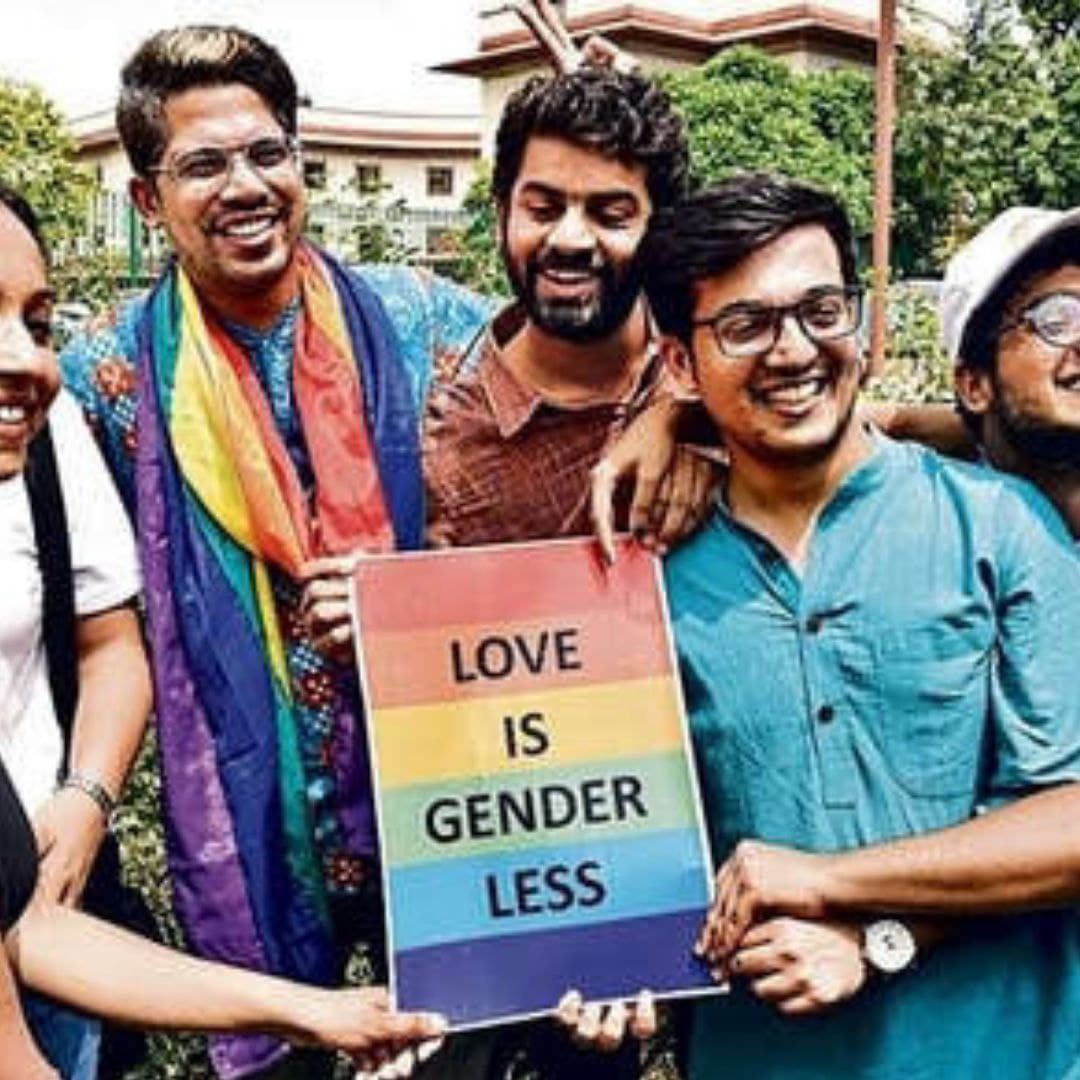
Image Credit: Hindustan Times
What Does September 6 Mean For The LGBTQ Community?
India, 6 Sep 2021 3:19 PM GMT | Updated 6 Sep 2021 4:03 PM GMT
Editor : Madhusree Goswami |
A mountain girl trying to make it big in the city. She loves to travel and explore and hence keen on doing on-ground stories. Giving the crux of the matter through her editing skills is her way to pay back the journalism its due credit.
Creatives : Neelima Mishra
Guru Govind Singh Indraprashtha University in New Delhi is where Neelima Mishra is doing her master's degree. She graduated from Delhi University with a bachelor's degree in journalism (hons.). She is pursuing a corporate communication specialisation at IP University.
On September 6, 2018, the Supreme Court in a landmark judgement decriminalised Section 377. People from the community recall how they reacted on that day.
Three years ago, the Supreme Court in a landmark judgment decriminalised Section 377 of the Indian Penal Code (IPC). Among other things, it has encouraged LGBT persons all throughout India to seek legal and societal recognition for their rights. There have been instances of people from the community being extorted by the cops, of them being shunned by society.
In 2009, Ihe Naz successfully challenged the constitutional legitimacy of Section 377. The long journey has been a roller coaster ride. Members from the commuity started approaching the lawyers Collective office after a major victory in a HIV case in 1997. The stories of them being blackmailed by the police, their casual partners, parents etc, was an impetus to find a solution. The quest led the community to locating section 377 as the source of evil. Then it was a matter of treading the long road to reclaim the community's rights. Following the dismissal of their review petitions, they filed curative petitions. They also filed writs of habeas corpus. They were snatched up, and the rest, as they say, is history. The Logical Indian spoke to some people from the community about their lives before and after the judgement and here is what they had to say:
Ameya Phadnis, a 47-year-old gay man, expressed his thanks to the Supreme Court for this historic decision, saying that even though he was out of the closet and open about his sexuality, there were still many things that he and other LQBTQ people were lacking. "My parents have been quite accepting of me since the day I came out to them, which I consider a gift, but not everyone is that fortunate. Many people were still frightened to come out, and this decision has provided them with a good outlet to express themselves. I remember being on cloud nine the day the decision was announced," he told The Logical Indian..
Phadnis pointed out that Bollywood's portrayal of lesbians, gays, bisexuals, and transgender people should evolve and stop portraying them as the stereotypical feminine fashion-designer. "The portrayal of LQBTQs is changing like as in Aligarh, My Mother's Girlfriend, Sheer Korma. Bollywood has a strong impact on the attitude of a big portion of the country's people. Since a decade, the media has been a strong supporter of the LQBTQ community, helping to normalise such relations among the general public. It is not generational differences that is preventing individuals from adapting to or normalising LGBTQ relationships, but rather their extremist ideology," he added.
Iqbal Delhavi earlier known as Shambhav Sharma appeared in one of the episodes of Satyamev Jayate. He identifies as a Muslim gay and was co-founder of Queer Campus during his college days. He has had a difficult existence as a homosexual man and despite being outspoken about his sexuality and coming out to his family at a young age, he has encountered a slew of personal issues simply for his choice of a partner. "I know what I am and dontabout the biases and misunderstandings, but I have had my fair share of troubles just for my sexuality," he said.
He was living with this then boyfriend who is an Italian, and they were together for seven years before being apprehended by the police and interrogated. "The cop asked things like , 'Are you guys sleeping in the same bed? If so, why?," he said. Being an Italian, Delhavi's partner was told that he would be denied a visa in the furure and it caused his partner to leave him and return to Italy. All of this occurred just seven months before the ultimate verdict, leaving him angry about the whole situation. "When the verdict was announced, I thought to myself why the celebration? Nothing was going to change for me, I had lost the person I loved, and I wished I could turn back time and bring him back to me, but as time passed, I realised how selfish I was. After the verdict there is ounce of hope that the judiciary will protect us in future and will legalise same sex marriage, will bring anti-discrimination law to help us in normalising LQBTQrelationships," he added.
Teku Khatri, a senior manager by profession in Axis Bank, said," I went office that day just like any normal day wearing my pink shirt an when the verdict came out long-time partner Jayesh Desai, who is founder of Gay Bombay called me up and gave me the good news leaving me in tears. This confused my collagues as i had not come out to them yet. For me it had not changed much as I was already out to my family and close friends but after the verdict the corporate industry started being more accepting. It was like a dream come true".
Khatri said that Axis Bank is the first Indian bank to give perks to the LQBTQ by providing them medical insurance for same sex partners.
Aqsa Shaikh, a transwoman heading a COVID centre talked about how Section 377 was used to criminalise consensual sex between two adults. As a result, it was difficult to carry out healthcare programmes. "For us, September 6, 2018, was a day for dual celebrations as we could participate as equal citizens in this country and not be punished for a physical consensual act. While the judgement was progressive it stopped short of talking about adoption, marriage other rights which a spouse in our country is entitled to. It is not recgnised by civil union and probably it will take quite some to become a reality but then this a right for which demands have been made. There are petitions pending in the courts but we hope whenever they are heard, the courts will take a sympathetic view and will give civils rights to people from the LQBTQ community. Instances of physical and emotional violence towards members of the community has reduced a lot," she added.
Though it has been a long and winding path, the triumph delivered by a constitutional court was certain to stand. The victory is now firmly established in our society, especially among the young, who will experience a changed world, thanks to the mobilisation of the communities.
Also Read: Unheard Social Media Requests: The Abysmal Case Of India's Orphans
 All section
All section














